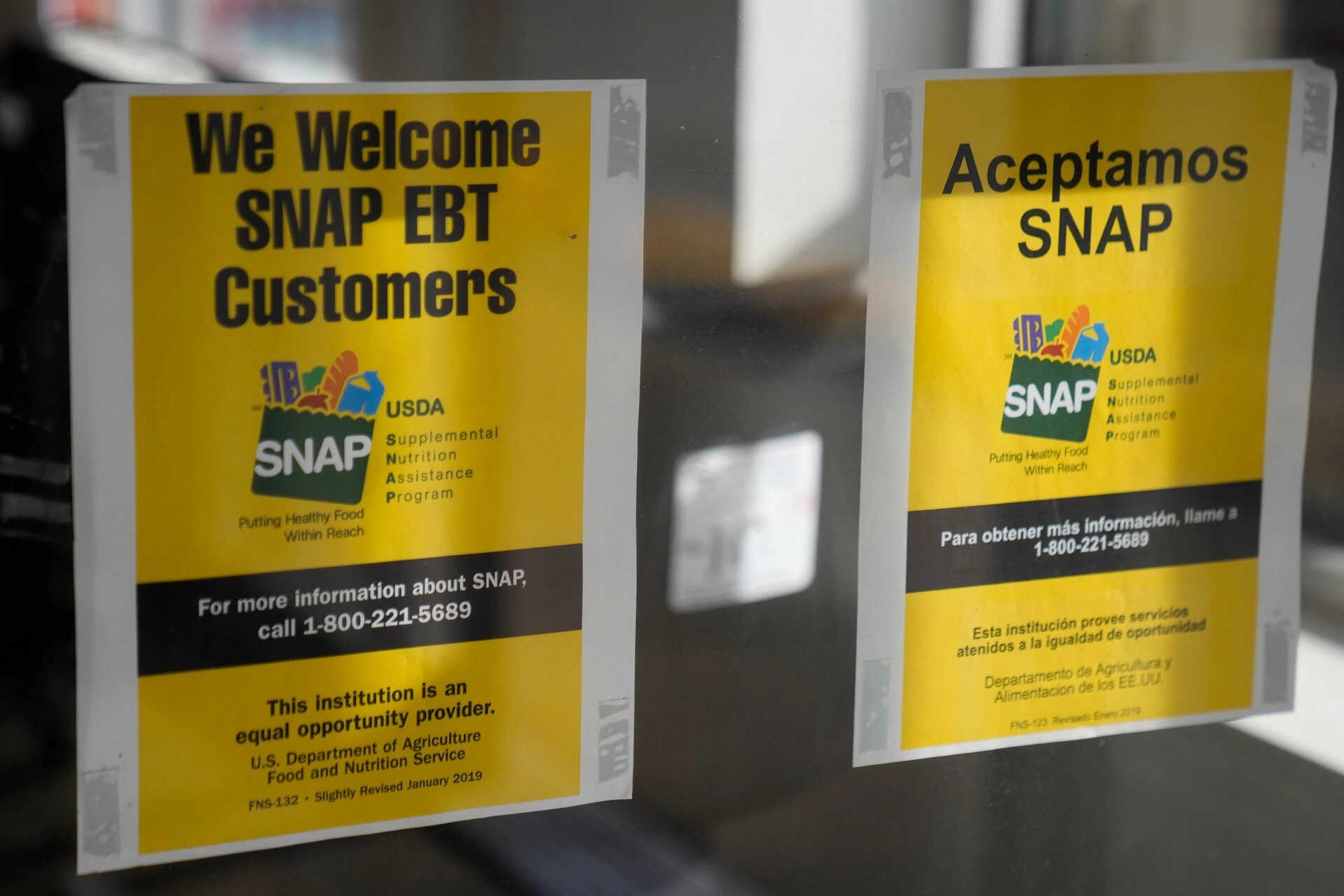The messages come after the Trump administration blamed Democrats for the shutdown on federal sites.

Several Democratic states are blaming President Donald Trump and Republicans in Congress for the government shutdown on government websites, as the funding cliff for the millions who rely on federally funded food aid — which is known as SNAP — rapidly approaches.
A POLITICO review of all 50 states and D.C.’s SNAP websites found that most have added notices to state webpages about federal benefits. But a handful of Democratic-controlled states — Illinois, Massachusetts and Pennsylvania — are using the sites to draw attention to their political opponents. California also calls out the “failures of Trump and Congress,” which is under GOP control.
“President Trump is currently choosing to not issue November SNAP benefits that help you and many families put food on the table,” an alert on the Massachusetts webpage for SNAP benefits reads.
A similar notice on Illinois’ Application for Benefits Eligibility page blames “federal officials with the Trump Administration” for the shutdown’s effects, while Pennsylvania’s Human Services Department says SNAP benefits will lapse “because Republicans in Washington D.C., failed to pass a federal budget.”
The funding gap will hit Nov. 1, right before the holiday season when food banks typically experience higher demand. Despite pressure from Democrats, House Speaker Mike Johnson told House Republicans on Tuesday that GOP leaders do not plan to put a standalone bill for expiring food aid benefits up for a vote, insisting the onus was instead on Democrats to pass a complete funding bill.
The notices come after several federal agencies added banners to their webpages earlier this month blaming Democrats for the shutdown. The website for the Department of Agriculture, which administers SNAP in partnership with state governments, features a banner declaring that “Senate Democrats have now voted 12 times to not fund the food stamp program” and explaining that benefits will lapse Nov. 1.
“We are approaching an inflection point for Senate Democrats,” the notice reads. “They can continue to hold out for healthcare for illegal aliens and gender mutilation procedures or reopen the government so mothers, babies, and the most vulnerable among us can receive critical nutrition assistance.”
Ethics experts have raised concerns that those federal postings could violate the Hatch Act, a law that limits political activities of federal employees, or other federal ethics laws. Rep. Robert Garcia (D-Calif.), the top Democrat on the House Oversight Committee, called for an investigation into possible criminal wrongdoing related to the notices.
Laws restricting political activity by government workers vary from state to state, but several — including Illinois and Massachusetts — restrict state employees from engaging in political behavior on public time or using public resources.
Massachusetts Gov. Maura Healey defended her state’s online messaging.
“The facts are that Donald Trump right now is refusing to fund SNAP even though he’s got the funds to do it,” Healey told reporters Monday. “The facts are that every other president during a federal shutdown has continued SNAP benefits for kids, for our seniors, for people with disabilities even during a shutdown, using contingency funds. Donald Trump is choosing not to do that. Donald Trump is choosing not to feed people in America, including in Massachusetts. Those are the facts.”
More than a million people living in Massachusetts and nearly 2 million Illinoisans are SNAP recipients, according to government data.
Of the webpages for all 50 states and D.C., 44 sites featured a message about the government shutdown as of Tuesday afternoon. In addition to the three that explicitly mentioned Trump and Republicans, two — California and Washington state — laid the blame simply at the hands of “the President and Congress.” No Republican-controlled states featured notices with partisan rhetoric.
Democratic states have been aggressive in their attacks on Republicans over the lapse in food assistance, with attorneys general and governors from 25 states suing the Trump administration Tuesday over its decision not to tap emergency funds to keep food aid flowing during the shutdown.
Carole Johnson, who served as commissioner of the New Jersey Department of Human Services from 2018-2021, said state officials ultimately “know best how to convey messages and reach people with messages in their communities.”
“I think people of all political stripes have experienced financial hardship at some point in their life, and may have needed the help and support of these kinds of programs, and so we want to make sure that people who need access to these critical programs are able to get it,” said Johnson, who also served as administrator of the Health Resources and Services Administration under the Biden administration.
Other states opted for more neutral messaging: The webpage for New York’s Office of Temporary and Disability Assistance, for example, urges residents to call their representatives in Congress “to let them know how these cuts would impact you, your family, and your community.”
Maryland and Virginia have used their state’s websites to draw attention to their governors’ efforts to address the impacts of the shutdown, with a banner on Maryland’s webpage declaring that “the Moore-Miller Administration is committed to supporting Maryland’s federal employees and other workers impacted by federal actions.” The banner redirects to a video in which Democratic Gov. Wes Moore laments that “Washington failed to govern.”
Michael Leach, who oversaw South Carolina’s Department of Social Services for more than five years, said he hopes to see states prioritize facts about how the lapse in benefits will impact recipients.
“That’s where the focus should be: making sure that people know what’s going on, what’s going to happen to them, what are the alternative options that may be available to them,” Leach said. “That’s where I believe our focus at the state level needs to be, because it is going to be disruptive.”
